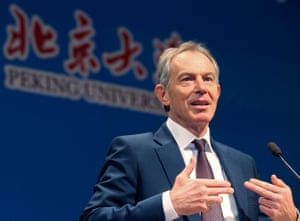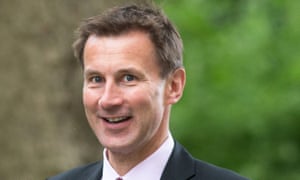Emails show oil firm questioned complex structure of Blair’s company, and reveal his closeness to Chinese leadership
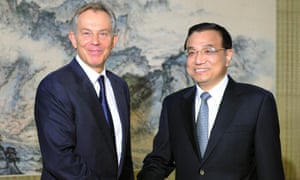
Tony Blair meets China’s then vice-premier, now premier, Li Keqiang in Beijing in 2011. Photograph: Rex/Shutterstock
When Jonathan Powell, the gatekeeper to the corporate empire of Tony Blair, sat down to lunch with the former Saudi intelligence chief Prince Faisal Al Turki in June 2010 he could not have known how lucrative it would turn out to be for the former British prime minister.
As the high-profile mediator of the stuttering peace process in the Israeli-Palestinian conflict, Blair had to be careful not to mix business with pleasure. However, one of those lunching with Powell at the annual “global mediator’s retreat”, organised by the Norwegian Ministry of Foreign Affairs, was looking to make a deal.
--------
-----
Nawaf Obaid, a security analyst who accompanied Prince Faisal, emailed Powell a week later, according to documents seen by the Guardian, with a suggestion to work with his brother Tarek’s company, PetroSaudi, which he “co-founded and co-owns with Prince Turki bin Abdullah, son of King Abdullah”.
“They have several projects that [they] are working [on] and I think it would [give] a very interesting perspective to see if we could establish a strategic partnership with former PM Tony Blair and yourself,” he wrote.
When Jonathan Powell, the gatekeeper to the corporate empire of Tony Blair, sat down to lunch with the former Saudi intelligence chief Prince Faisal Al Turki in June 2010 he could not have known how lucrative it would turn out to be for the former British prime minister.
As the high-profile mediator of the stuttering peace process in the Israeli-Palestinian conflict, Blair had to be careful not to mix business with pleasure. However, one of those lunching with Powell at the annual “global mediator’s retreat”, organised by the Norwegian Ministry of Foreign Affairs, was looking to make a deal.
--------
Bird and Fortune on Blair's socialism
-----
Nawaf Obaid, a security analyst who accompanied Prince Faisal, emailed Powell a week later, according to documents seen by the Guardian, with a suggestion to work with his brother Tarek’s company, PetroSaudi, which he “co-founded and co-owns with Prince Turki bin Abdullah, son of King Abdullah”.
“They have several projects that [they] are working [on] and I think it would [give] a very interesting perspective to see if we could establish a strategic partnership with former PM Tony Blair and yourself,” he wrote.

Tarek Obaid
Tarek Obaid was a former banker who styled himself as an adviser to members of the Saudi royal family and a director of a joint venture with Malaysia’s multibillion-dollar development fund, 1MDB. This fund had put $300m through PetroSaudi and as the latter’s chief executive, Obaid was on the lookout for deals.
On paper PetroSaudi looked impressive: its chief investment officer was a former Goldman Sachs banker, Patrick Mahony. The chief operating officer was listed as Rick Haythornthwaite, a City insider who was also chairman of Network Rail and MasterCard.
Blair’s team sold the former prime minister as someone who could help “unlock situations which might otherwise be blocked by political factors” in places such as China and Africa. PetroSaudi was interested in Beijing’s appetite for oil and how Blair’s firm could help.
The role assumed by Blair shows his influence in one of the most important areas of global economic cooperation this century: between the oil sands of the Middle East and hydrocarbon-hungry China.
While in office, Blair oversaw the handover of Hong Kong to China, but visited the latter just five times. His sixth visit in 2007 – when he earned £200,000 for a speech in the industrial city of Dongguan – marked a turning point in how he viewed the rising power.
Since then Blair has been back two dozen times and has built a reputation for befriending the rising stars of Chinese politics. In March 2010 he secured a meeting with Li Keqiang, now China’s premier.
PetroSaudi signed up Blair’s team to lobby Beijing in the summer of 2010 and internal PetroSaudi correspondence reveals there were questions raised about the apparently opaque nature of Blair’s businesses and the role he could play.
Tarek Obaid was a former banker who styled himself as an adviser to members of the Saudi royal family and a director of a joint venture with Malaysia’s multibillion-dollar development fund, 1MDB. This fund had put $300m through PetroSaudi and as the latter’s chief executive, Obaid was on the lookout for deals.
On paper PetroSaudi looked impressive: its chief investment officer was a former Goldman Sachs banker, Patrick Mahony. The chief operating officer was listed as Rick Haythornthwaite, a City insider who was also chairman of Network Rail and MasterCard.
Blair’s team sold the former prime minister as someone who could help “unlock situations which might otherwise be blocked by political factors” in places such as China and Africa. PetroSaudi was interested in Beijing’s appetite for oil and how Blair’s firm could help.
The role assumed by Blair shows his influence in one of the most important areas of global economic cooperation this century: between the oil sands of the Middle East and hydrocarbon-hungry China.
While in office, Blair oversaw the handover of Hong Kong to China, but visited the latter just five times. His sixth visit in 2007 – when he earned £200,000 for a speech in the industrial city of Dongguan – marked a turning point in how he viewed the rising power.
Since then Blair has been back two dozen times and has built a reputation for befriending the rising stars of Chinese politics. In March 2010 he secured a meeting with Li Keqiang, now China’s premier.
PetroSaudi signed up Blair’s team to lobby Beijing in the summer of 2010 and internal PetroSaudi correspondence reveals there were questions raised about the apparently opaque nature of Blair’s businesses and the role he could play.
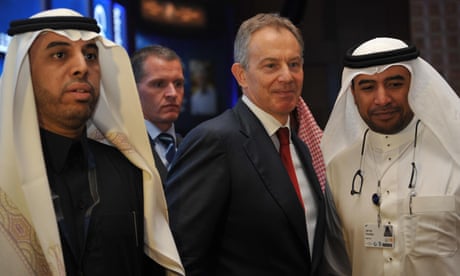
Tony Blair courted Chinese leaders for Saudi prince's oil firm
PetroSaudi executives warned in early September 2010 that they had “no contractual nexus with TB” and were anxious about “the lack of apparent employment or other involvement of TB in the corporate structure”.
To convince PetroSaudi that if it paid it would get Blair, his executives revealed for the first time how his complex web of companies worked. Blair’s businesses are split into two wings: Firerush, which was governed by the then City regulator the Financial Services Authority, and Windrush, which was not.
What bothered PetroSaudi was that it was paying roughly $55,000 to Firerush and about $10,000 to Windrush. Both firms trade as Tony Blair Associates (TBA).
From early on in their relationship PetroSaudi executives admitted they knew “very little” about Blair’s firms. In an email in August 2010, the company’s executives said they “would like to understand more about the structure and the relationship between Firerush, TB Associates and TB. In particular, the engagement letter mentions the provision of services by employees of Firerush which seems, like a number of concepts in the engagement letter, inappropriate given we are only looking to engage with TB.”
To allay concerns in November 2010, Varun Chandra, a former Lehman Brothers banker and director of TBA, told PetroSaudi that Blair was the “ultimate owner of all this and owns all the share capital” of all the companies. He told PetroSaudi it was not relevant which company got paid “given where the cash ultimately ends up”.
Chandra explained that Firerush executives handled the day-to-day conversations about “specific opportunities and making the arrangements to drive negotiations forward. Tony, procured by Windrush, is involved at higher level but on an ongoing basis, meeting with senior political leadership and business heads in order to discuss PetroSaudi at a strategic level and to speak highly of your management.”
PetroSaudi, he said, had already seen the benefit as “the man in charge of China’s economic policy is now supportive of working with PetroSaudi, and … he has spoken with CNPC [China National Petroleum Corporation] to ensure a proper working dialogue”.
By November 2010 TBA was hired and, according to the documents, Blair had found time to put PetroSaudi’s case to Lou Jiwei, the then chairman of the China Investment Corporation and now the nation’s finance minister.
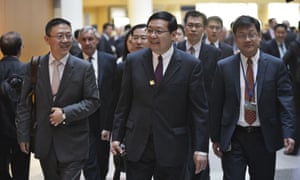
Lou Jiwei, centre, arrives for a G20 finance ministers’ and central bank governors’ meeting at the IMF on 15 April. Photograph: Mandel Ngan/AFP/Getty Images
Questions could be raised about why Blair was allowed to promote the interests of the son of the then ruler of Saudi Arabia in China while also working as the Middle East peace envoy for the Quartet – the US, UN, EU and Russia. Blair had also faced criticism for halting a Serious Fraud Office inquiry in 2006, while prime minister, into alleged corruption over a multibillion-pound arms deal with Saudi Arabia. He denies any conflict of interest.
PetroSaudi had made it clear it wanted to hire Blair. In an internal 2010 document entitled “story for Blair”, PetroSaudi sold itself as a “vehicle of the Saudi royal family” that could count on the “full support from the kingdom’s diplomatic corps” and was set up by Prince Turki bin Abdullah and Obaid, who hailed from a “prominent business family”.
PetroSaudi’s pitch in the document was that it claimed “many countries will get a company in but then bully it around once it is there and has sunk billions of dollars in the ground. This will not happen with [PetroSaudi] because these nations do not want to get on the wrong side of the Saudi royal family.”
But access to the legendary Blair contacts book does not come cheap. In July TBA’s then chief operating officer, Mark Labovitch, emailed Mahony to say he had “discussed your strategy and objectives with Tony and believe strongly that we can add value to PetroSaudi’s business development … We would propose a retainer fee of $100,000 per month.”
The documents reveal that even before Blair’s company was hired, he was already promoting the oil firm. In late July 2010 Blair was in Shanghai to celebrate the planting of 1m trees in north-west China to combat climate change. A few days later, Labovitch emailed the London-based oil firm to say: “Tony has just been in China and informally sounded out a number of people.”
Tarek Obaid and Blair did meet privately in early July 2010, and apparently discussed a working relationship. A month later Blair’s company was on a retainer fee of $65,000 and a “success fee equal to 2%” of any deal that TBA brought to the company – which PetroSaudi admitted could “potentially be a very large sum”.
In the following months a picture emerges of corporate bonhomie underwritten by spiky internal exchanges over the cost of hiring the former prime minister, his apparent obsession with privacy and a whirl of phone calls with global leaders.
By August 2010, according to documents, PetroSaudi raised concerns internally that TBA’s proposed contract was “more appropriate to an investment bank (eg they can record our phone calls)”. In an email, Mahony described the contract offered by Blair’s lieutenants as “a very aggressive first draft with almost total limitation of liability for TB”. He wrote: “I should note that the aggressive starting position of his engagement letter most probably is cynically reliant on counterparties taking a passive approach to secure his services.”
But at the end of the month Blair was in the Chinese capital for the signing of a partnership agreement between Peking University and his Faith Foundation, and managed to squeeze in some time with the Chinese oil giants CNPC and China National Offshore Oil Corporation, as well as China’s supreme economic council, the National Development and Reform Commission.
Tony Blair gives a speech at Peking University in Beijing in 2012. Photograph: China Daily/Reuters
“The latter effectively ‘blessed’ your engagement with Chinese companies, and the former were both very keen to meet you and work out how you might collaborate,” Blair’s then chief operating officer told PetroSaudi. “We clearly articulated the benefits of partnership with you to them, which they grasped immediately.”
In November, Blair was back in Beijing to give a speech for his Faith Foundation. He also had a meeting with China’s vice-premier, Wang Qishan, who Blair’s firm told PetroSaudi was “crucial – inter alia in order to highlight the wider benefits of a partnership with PetroSaudi in terms of putting Chinese companies in pole position for Saudi infrastructure tenders”. Wang is now a member of the Chinese Communist party’s politbureau, the country’s highest decision-making body.
Blair’s relationship with PetroSaudi appeared to give him access to the Saudi elite. In December 2010 an executive of PetroSaudi said the company could arrange a dinner for Blair with Prince Turki. Blair’s office say this never took place.
The next month Blair’s office emailed PetroSaudi because he was keen to meet the King of Saudi Arabia and Prince Bandar, the secretary general of the country’s national security council, before the February 2011 Quartet meeting to discuss Middle East peace after the Egyptian revolution.
“The latter effectively ‘blessed’ your engagement with Chinese companies, and the former were both very keen to meet you and work out how you might collaborate,” Blair’s then chief operating officer told PetroSaudi. “We clearly articulated the benefits of partnership with you to them, which they grasped immediately.”
In November, Blair was back in Beijing to give a speech for his Faith Foundation. He also had a meeting with China’s vice-premier, Wang Qishan, who Blair’s firm told PetroSaudi was “crucial – inter alia in order to highlight the wider benefits of a partnership with PetroSaudi in terms of putting Chinese companies in pole position for Saudi infrastructure tenders”. Wang is now a member of the Chinese Communist party’s politbureau, the country’s highest decision-making body.
Blair’s relationship with PetroSaudi appeared to give him access to the Saudi elite. In December 2010 an executive of PetroSaudi said the company could arrange a dinner for Blair with Prince Turki. Blair’s office say this never took place.
The next month Blair’s office emailed PetroSaudi because he was keen to meet the King of Saudi Arabia and Prince Bandar, the secretary general of the country’s national security council, before the February 2011 Quartet meeting to discuss Middle East peace after the Egyptian revolution.
